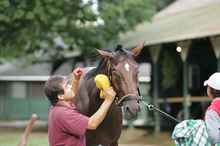Bimeda® has launched the only FDA approved oral treatment for ringworm in horses which comes packaged in 15 g pouches containing 2.5 grams griseofluvin.

Improving skin care for your horse
Griseofulvin is a time-tested, effective treatment prescribed by equine veterinarians around the world and these handy granules are added to a horse's feed for convenient treatment of equine ringworm.
“Griseofulvin is a time-tested, effective treatment prescribed by equine veterinarians around the world. These handy granules are added to a horse's feed for convenient treatment of equine detmatophytosis (ringworm)," says David Ellefson, DVM, Director of Bimeda’s Technical Services.
Griseofluvin Powder’s Benefits:
- Orally Effective Antifungal Treatment: Specifically active against superficial fungi which cause tinea (ringworm) of the skin and hair.
- Microsized: Finer particle size provides greater surface area for absorption and drug available for fungistatic action in the skin and hair.
- Economical: Available in 15-gram packet sizes (2.5 grams Griseofulvin).
- Ease of Use: Powder may be given on a small amount of feed or in a drench.
- Usual Dose: One half to one packet daily.
This product will be available through Bimeda’s nationwide network of authorized animal health veterinary product distributors. Veterinarians needing Griseofulvin for their charitable work may contact Bimeda at info@bimedaUS.com for assistance.
More about ringworm in horses:
Ringworm is a highly contagious zoonotic fungal disease that can infect humans, dogs and cats, as well as horses. It is caused by the fungal species Trichophyton equinum. Though not considered a serious disease, it can spread throughout the stable or herd, affect staff and owners, and prevent the normal use of the horse.
Ringworm develops in a circular pattern with patches of raised hair. The hair gives way easily if rubbed or plucked, and hair loss follows, leaving a scaling of the underlying skin. Small pustules often develop.
Initially lesions are itchy and remain sensitive to touch for long periods. Lesions are most common on the head, but can occur on the legs, feet, body or tail area.
CAUTION
Federal law restricts this drug to use by or on the order of a licensed veterinarian.
WARNING
Do not use in horses intended for human consumption.
The safety and efficacy of prophylactic use of griseofulvin has not been established. This drug should not be used to treat minor or trivial infections. Safety of griseofulvin for use in pregnant animals has not been established. It has been reported in the Soviet literature (N.N. Slonitskaya; Teratogenic Effect of Griseofulvin-Forte on the Rat Fetus/Antibiotiki 14(1): 44-48, 1969) that a griseofulvin preparation was found to be embryotoxic and teratogenic on oral administration to pregnant Wistar rats. In addition, pups and kittens with either cleft palates or other abnormalities have been reported in litters of bitches and queens treated with griseofulvin during gestation.
PRECAUTIONS
Patients on prolonged therapy with any potent medication should be under close observation. Periodic monitoring of organ system function, including renal, hepatic, and hemopoietic, should be done.
This antibiotic is derived from a species of Penicillium griseofulvum. A number of known penicillin-sensitive humans have been treated with griseofulvin without difficulty. In veterinary medicine, the drug apparently has no allergenic properties; however, considerably more experience in this area must be obtained before definite conclusions may be drawn.
Griseofulvin administered to animals intraperitoneally or intravenously in massive doses will produce damage to the seminal epithelium; however, no such effects have been observed following oral administration of usual clinical doses to dogs and cats.
Studies to date indicate that the usual clinical doses of griseofulvin administered orally have no effect on spermatogenesis. More evidence is needed, but it appears likely that such effects noted are related to the massive doses administered by the parenteral routes. The effects of griseofulvin on stallion spermatogenesis are not known.
About Bimeda
Bimeda is a global manufacturer and marketer of a variety of unique and generic animal health pharmaceutical product dosage forms produced in seven manufacturing plants in Brazil, Canada, Ireland, Kenya, UK, and the USA. Additional information regarding Bimeda and their products is available by visiting www.bimeda.com or calling 1-888-524-6332.
Bimeda’s US headquarters is located in Oakbrook Terrace, IL.
